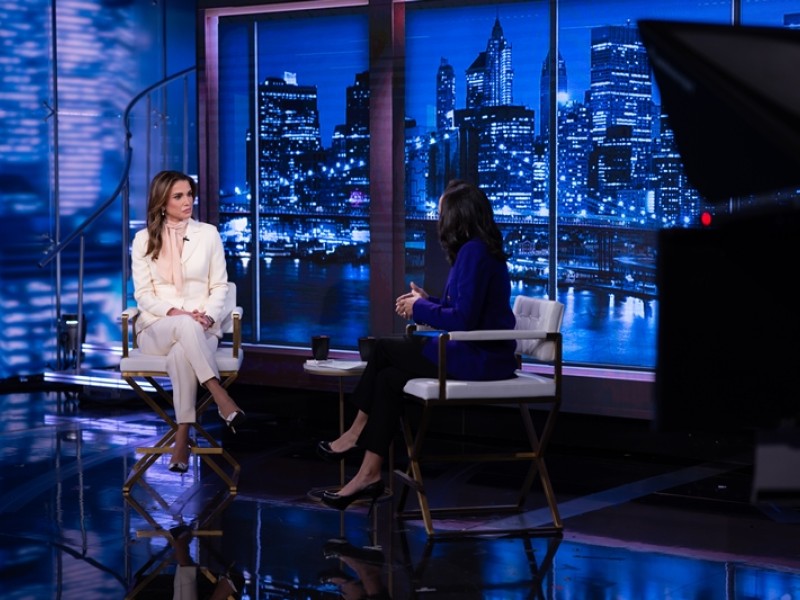Queen Rania’s Discussion with MSNBC’s Ali Velshi at 2024 Milken Institute Global Conference
Queen Rania: Well, thank you, first of all, Ali, for the introduction. And thank you everyone for choosing to be here today. I think this conversation comes at a time that is extremely crucial for us to have. As you know, the last seven months have been traumatic and really heartbreaking for everybody, not least of all the people on the ground, who are facing danger, day after day after day. But I think the danger that is equally important that we need to think about is what this conflict has done to the rest of the world. What we're seeing is that it has revealed and exposed old fractures. It has deepened divisions, and it has divided people along new battle lines. And I think that is a very dangerous situation, because one of the most dangerous features of our world today is polarization.
Polarization leads to binary thinking. It makes us think of our world as: us versus them, left versus right, East versus West. And even though that might give us a false sense of security that we belong in a certain camp, it actually inadvertently really puts constraints on us, because it kind of limits the way we think, what we should do, what we should say… And, more importantly, it makes us look at everybody outside our camp as the rival, as the enemy – somebody you can erase, somebody you can dismiss. And actually, studies have shown that, as humans, we are instinctively more likely to be attuned to the suffering of people who are like us. And that kind of selective empathy actually has terrible real-life consequences, because it affects where we look and what we see.
Ali Velshi: Yeah.
Queen Rania: And this is happening in this conflict. People are feeling so emotional about it, people are in either this camp or that camp. And I've seen the middle ground sort of shrink, year after year after year. When it comes to the Palestinians, I think they've been pushed to the periphery, where their suffering has become almost unnoticed, and where they become almost a people unto whom anything can happen without consequence. And that's why it's important for us to actually find that middle ground, to find that third way. It's so dangerous when we reduce people to just a nationality or skin color or political views – because, as human beings, we're so much more complex than that.
And so, I think what I want to say at the outset is I'm not here to try to change anybody's mind. But if there's anything I want to achieve it is for people to come out of this thinking that there is more to this issue, that it is actually complex, and that it needs to be approached with a lot of nuance. And for us to try to find the third way. It doesn't have to be this way; you don't have to be either pro-Israel or pro-Palestine. There needs to be a middle ground. And I think one thing that we can start of, as a middle ground, is maybe agree on three things:
First of all, that the current status quo is not sustainable. It's not sustainable for Palestinians or for Israelis. Second, that peace cannot be achieved through violence – through wars, through weapons. It has to be achieved through negotiations, political process, even-handedness, and commitment. And the third thing that we need to remember is that the majority of people who are suffering from this conflict on both sides are just ordinary people, who want the same things that we all want: to just live in safety with the people that we love, for our children to have access to healthcare, education, to a better future.
Ali Velshi: Jordan has had a peaceful relationship and a fairly functional relationship with Israel for some time. So to some degree, you've seen the model of how it can work. Given how extreme and how polarized we are now, is your sense of a future for an Israeli people and a Palestinian people that is safe and secure – are we farther away from it? Or could it actually happen?
Queen Rania: Well, if you ask most people, they roll their eyes and they say that the two-state solution is dead, that this conflict is intractable. And it is probably the most intractable conflict of our era. But it's not because we don't know what needs to be done, but because there's been a lack of seriousness and commitment and political will to get it done. And the approach hasn't been the most productive kind of approach. So for those people who say it can't be done, I'll say, well, again, point one, the status quo is not sustainable.
Ali Velshi: Right.
Queen Rania: So what is the alternative? Is the alternative an endless occupation? How will Israel continue to manage that? Will they continue just to use security measures? If that's the case, then anytime there's a peace in Israel, that's just going to be the lull. It’s going to be the calm before the storm until the next cycle of violence happens. Is it going to be a one-state solution? But then what does that look like? Does that become like an apartheid state? Is it that we're going to send them, you know, ‘let them go to Jordan, let them go to Egypt?’ You know, Jordan has said before that we reject any attempts to transfer the population of Palestine and to drive them away from their homes or their land. And another wave of refugees will actually amount to another Nakba, which the Arab World does not want to see. And people need to understand when they say, ‘why don't you take them,’ which is something that we hear quite often, they need to understand what they're asking for. The forcible transfer of an occupied population is a war crime. And we don't want to be participants in that. It is called ethnic cleansing. And, Palestinians do not want to be part of Jordan or Jordan to be part of Palestine. So that option is not on the table.
So is it endless occupation? What is it? The only way is for a two-state solution. But we need to look at what we did in the past and try to understand why we failed. And part of it is that we need to understand that it cannot be done by the Palestinians and Israelis alone. And the US plays a very important role, because it is the single most powerful country in terms of its leverage on Israel. And so it depends how much the US is willing to use its political capital to hold Israel accountable.
Now, in the past, what used to happen is, in negotiations, they used to always start off on the premise of: ‘What will Israel accept to do? What are the terms that it will agree on?” – not ‘what is required from Israel to do at the bare minimum, as dictated by international law?’ So, the starting point needs to be a legal framework that is recognized by the international community, and then a commitment from the US to hold Israel accountable when it doesn't stick to the terms – of course, as well as the Palestinians.
Now, a lot of people would see what I'm saying, as, you know, ‘But the US is Israel’s strongest ally.’ I am not asking for the US to turn against Israel. But to be a good ally, you call your ally out went they're not doing the right thing. Being a good ally doesn't mean you just sign off on anything and everything your friend does. And if I was the United States today, and I was looking at what's happening in Israel – a country that I care about, and that's my ally – I would be saying: Is this war making Israel safer? And whatever Israel achieves in terms of short-term tactical gains against Hamas, aren't they coming at a very heavy, long-term cost towards Israel’s security? Isn't it coming at a heavy cost in terms of the reputational damage that has happened to Israel, the image that has happened, the way that it's distanced Israel from many of its allies? And so, is this war the best way to achieve Israel's long-term security? As the United States, am I going to prioritize the political agenda and survival of one man, the prime minister, and the ideological, ultra-nationalist and religious far-right that exists in his cabinet? Am I going to be prioritizing their agenda over the long-term safety and security of the state of Israel?
And so sometimes, you know, holding Israel accountable is actually in the best interest of the people of Israel, and their long-term interest. And so, again, you know, it is not just about trying to persuade Israel to do the right thing. Actually, there needs to be consequences when one side of the negotiating parties are not sticking to the terms of negotiation. So, I do believe that the only way that we can achieve security in our part of the world is through a negotiated peace, where Palestinians have not a promise of statehood, but an actual statehood. They can't be given just a package of a patchwork of an emasculated state, without any symbols of sovereignty. They need to have control over their own lives, self-determination, autonomy. They've been living under occupation, oppression, and dispossession for too long. And when we look at whose fault it is, and this cycle or that cycle, we could keep going back and forth, but it all comes back down to an illegal occupation. You want safety and security, we need to end the occupation because you cannot have a safe and secure Israel while there is a grave injustice on their border.
Ali Velshi: What do people…we have a very influential audience here. These are philanthropists, business leaders, and investors. If someone wants to make the outcome of this better, what can people do? Because we see this playing out on the international stage and it makes people feel impotent. There are these prevailing narratives, which you have discussed with us. What should influential Americans do?
Queen Rania: I think it’s to not just think of just the narrative. You know, I saw this video recently of Senator Mitt Romney asking Secretary of State Antony Blinken about, how did Israel get the PR wrong this time? And I was struck by the question, because I think the failure here is not about PR. It's not about how Israel is spinning the story. It's the problem with the story itself. The narrative cannot be so divorced from reality. You cannot continue to create a reality on the ground, but then sell a completely different narrative.
This war has killed more doctors, more aid workers, journalists, than any other conflict. It's killed 14,500 kids. So, that doesn't make sense. When you say Israel is the only democracy in the Middle East, well, how could a democracy be depriving an entire population of their human rights? When you say the IDF is the most moral army in the world, well, how is that true when veteran Israeli soldiers are saying that what we're doing is wrong, and when a lawyer from the army comes and says, the behavior is crossing the criminal threshold. So, what I'm trying to say is that it's not just about the narrative, it is about the reality itself. And as I said before, I don't care what we call…you know, you want to call it genocide, you don't want to call it genocide – it's a lot of people dying, and the fact that we're debating whether it is, that's shocking in and of itself.
So, I think what I want people to do is to not just think of a narrative, not just say, ‘this is the hero, this is the villain,’ to try to simplify it in that way. There's a lot more to it. And I think we all need to rally behind a third way that actually puts the people first beyond the political agendas of leaders or zealots or extremists.
Ali Velshi: So this is an interesting point, because we have pushed… hearts have hardened since October 7th, there's no question.
Queen Rania: So much.
Ali Velshi: And you have often brought out, not in just this context, but in other contexts, that we are in a world that is polarized, and we are pushing people toward the extremes. We are pushing people who might be in that moderate middle, including in Israel and the occupied territories and Gaza. There are fewer people who believe in a two-state solution in your part of the world. You know, we still talk about it, like it's a viable thing that if the United States fully gets behind, it can happen. But we also have a narrative that people are either pro-Israeli or pro-Palestinian, which I was not certain needed to be the case. I think one can believe in the determination…
Queen Rania: I think people should put people first. What we're demanding, what Palestinians want, is not sympathy or special treatment. They just want the impartial application of the law. What people are asking is, yes, there was outrage on October 7, and there should be. But why isn't there outrage about the number of people who are being killed now? Why is it okay for some people to have human rights where others are deprived of them? And this is something that's actually putting the US in a tight spot, because there's some contradictions in the US position. You have to give human life equal value, and you have to place equal condemnation on human rights violations. You cannot have credibility without moral consistency. And that's what we're seeing here: A global community that is not applying the same standards on different populations. And that's causing a lot of people in my part of the world to feel completely disillusioned and to actually lose faith in the global system, where they feel it's not just towards them.
Ali Velshi: Are those folks who mess this up, are those who have been pushed to extremes? Anti-Semites who will join pro-Palestinian rallies, who are not helping the argument? And in some of these counter-protests, as you saw in this city, you know, remarkable violence that doesn't…it doesn't help the dialogue on any front. We're going to have to get back to a point where, you might empathize more with one side than the other, but you're going to have to have some empathy for everybody.
Queen Rania: Absolutely. Edward Said, he said, just to paraphrase him, that the reality that we're in, the situation that we're in now is not inevitable. It is a result of choices, historic choices, made by men and women. It is manmade and it can be remade. And I think, for us who feel that this is an impossible problem to solve: It is solvable. It is. It's just about, like you said, for us to not just judge the other side as the enemy, but to really try to find the common ground, and the common ground is that we want the same things. And sometimes the things that we want are not the same things that our leaders want. And certainly in this situation, I think, not that they see it this way right now, because obviously the population in Israel are afraid, they feel traumatized and they've been taught by their leaders that Palestinians are not people like us. They are just security threats that we have to defend ourselves against. And that is not doing them justice, because ultimately, there is not going to be long-term security…Nothing can safeguard Israel and its long-term security as much as peace can. So there needs to be a reeducation, a re-humanization, between the two people. For the time being, I believe there can only be two states and two people living in separateness, until they can start to heal the wounds and to try to build the trust that has been lost now as a result of years of suffering. And we have a responsibility to try to stand behind the vision that delivers the people there the security and the future they deserve.
Featured
Queen Rania's official website
This website does not support old browsers. To view this website, Please upgrade your browser to IE 9 or greater
Your browser is out of date. It has known security flaws and may not display all features of this and other websites. Learn how to update your browser



